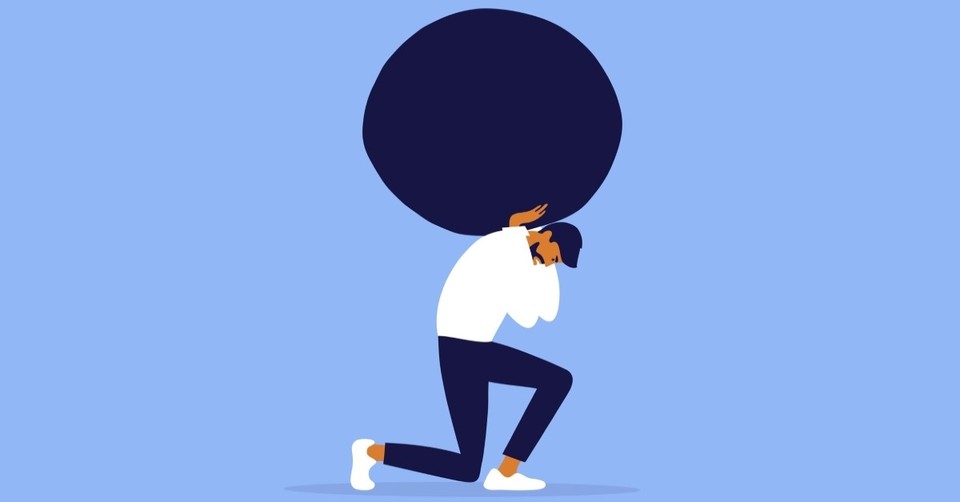Are You Casting Your Anxiety on Jesus or Carrying it Alone?

I think you will agree that anxiety is at an all-time high today. Because we are frail humans, anxiety and fear come naturally to us. To make matters worse, anxiety is contagious. We tend to take on the emotions and attitudes of those around us. Our anxieties can become a virus we inflict on those we love.
The problem with anxiety is that it wears you down. Fear, worry, and anxiety – used interchangeably in the scripture – wear us down. They crush and defeat us, destroying our joy. Because when it comes to anxiety – those are our two choices. We can either carry it ourselves or we can cast it on Jesus.
Highly successful people often deal with high levels of anxiety. Look at Elijah, for example. Elijah is one of my favorite characters in the Bible.
Elijah's story starts in 1 Kings 16 when Ahab is the king of Israel.
"Ahab began to rule over Israel … and did what was evil in the Lord's sight, even more than any of the kings before him … He married Jezebel, and he began to bow down in worship of Baal. Ahab built a temple and an altar for Baal in Samaria. Then he set up an Asherah pole. He did more to provoke the anger of the Lord, the God of Israel than any of the other kings of Israel before him." from 1 Kings 16:29-33
Ahab is a nasty, wicked king, worse than any king in the history of Israel. He married a witch, a woman named Jezebel, and began to worship Baal, a false God. Ahab even built a temple for this false God. Ahab raised an Asherah pole – a place where the human sacrifice of children was practiced. Ahab generally did everything he could to provoke God.
In 1 Kings 17, God sent Elijah to see the king and tell him it would not rain for three years.
And the three-year drought begins. Crops die. Rivers dry up. Fertile land becomes desert.
1 Kings 18 Ahab sends his 450 priests of Baal to fight Elijah. A prayer contest ensued. Who can pray to fire down from heaven? God answers the prayers of Elijah with a fiery display of his power. The 450 prophets of Baal were killed. Elijah prayed for rain to end the three-year drought, and God sent the rain.
Elijah was on a roll – but he was also worn out – so when the wicked queen Jezebel put out a hit on Elijah, he panicked and ran into the wilderness alone. There he found a solitary tree, under which he collapsed and prayed:
"I have had enough, Lord," Elijah said. "Take my life." 1 Kings 19:4
Wow. Do not miss this. Elijah instantly went from successful to suicidal. Why? Because he had been carrying all his anxiety alone and had not learned to cast it on God.
Have you heard of the acronym HALT? HALT is a self-evaluation tool. But, unfortunately, we get in trouble when we find ourselves in HALT mode.
Halt stands for
Hungry
Angry
Lonely
Tired
In Exodus 19, we can see how Elijah fits the HALT acronym. He was hungry – emotionally and physically. God sent an angel to encourage Elijah and give him food to eat. Elijah was so empty and hungry that God had to send an angel with encouragement and food twice!
Angry – Elijah obeyed God for three years and then made the queen's hit list. Elijah was angry. He was angry with the queen. He was angry with God and with life in general. Elijah was lonely. He made his assistant stay behind and was alone out in the wilderness. Not a good plan. To say Elijah was tired is an understatement. He had been running for three years and was exhausted. We make foolish decisions when hungry, angry, lonely, and tired. We can't think straight because fatigue makes fools out of all of us.
Elijah, a successful man of God, was so hungry, angry, lonely, and tired that he considered suicide. He prayed for God to kill him. His anxiety was choking the very life out of him. What can we learn from Elijah about anxiety?
When it comes to anxiety, we have two choices:
Carry it alone.
Cast it on God.
Elijah encountered God in the desert amid his pain, his depression, and his suicidal ideation. As a result, Elijah learned to cast his cares on God and experience renewal. He did that by practicing a New Testament principle found in the book of 1 Peter.
"Cast all your anxiety on Jesus because he cares for you." 1 Peter 5:7
The Greek word for cast is only used twice in the New Testament. However, the other passage where this verse is used gives excellent insight into the word's meaning.
It was Palm Sunday – the Sunday before the crucifixion and the resurrection. The disciples were to get a donkey for Jesus to ride on.
"They brought the donkey to Jesus and cast their garments on it …" Luke 19:35
Do not miss the precise meaning of the word "cast." Cast means to take the weight off your shoulders and place it on someone else. Badda beam. Badda boom. Pass the biscuits. I can carry my anxieties, or I can cast them on Jesus.
One more verse. This time Jesus makes the invitation obvious.
"Come to Me, all you who are weary and burdened, and I will give you rest. Take My yoke upon you and learn from Me; for I am gentle and humble in heart, and you will find rest for your souls. For My yoke is easy, and My burden is light." Matthew 11:28-30
Again – do not miss this. The "yoke" referred to here is a double ox yoke made of thick wood. This double ox yoke was commonly used in Jesus' day. Double yokes were used by farmers for a specific purpose - to teach a young farm animal to carry a burden without being overwhelmed. The young farm animal was placed in the yoke along with an older, more robust farm animal. The older, stronger farm animal would carry the biggest part of the burden while the younger animal learned.
"For my yoke is easy, and my burden is light." Matthew 11:30
There is still a yoke, a burden, and work to do, but it is easier and lighter because you have cast your burden on Jesus, who is carrying the load with you. Practically how do we do that? How do you cast your burden on Jesus? Back to our first verse.
"Cast all your anxiety on Jesus because he cares for you." 1 Peter 5:7
Here is where the rubber meets the road. How do you practically make the anxiety transfer from your back to God's back? Trust that he cares for you. Believe this promise. Trust him. It's a matter of practical trust. That promise does not hang in the air. It is connected to a command and was meant to show us how to obey that command.
The command is to cast your anxiety on God. The promise is that God cares for you. Jesus cares about the thing that is the source of your anxiety. Jesus cares about the thing that is worrying you. Jesus wants you to trust Him. Jesus wants you to quit carrying your burden alone. Jesus wants you to cast your care on Him.
There is another choice we have when carrying our anxieties and worries. We can share our burdens with Jesus, which He commands and invites us to do. We can share our burdens with others which Jesus also commands and invites us to do. So now we have two options. We should do both - share them with Jesus and with others.

Check out Galatians 6:2.
"Carry each other's burdens, and in this way, you will fulfill the law of Christ." Galatians 6:2
We absolutely can invite Jesus into this double yoke to share our burdens. We can also ask our brothers and sisters in Christ to share our burdens - people who love us enough to share our burdens, worries, and anxiety. But we tend to be stubborn people still in the terrible three's mode of thinking. What do three years old say all the time? "I do it myself."
"I do it myself" thinking will crush you when it comes to anxiety and worry.
We were not created to do the tough stretches of life alone. Instead, God created us to reach out to Him when life is hard.
We need God. We need each other.
What are you anxious about today? What are you worried about? What are you carrying alone?
We have two choices when we are experiencing worry and anxiety. We can carry it alone or cast it on Jesus and share it.
Toddlers carry all their anxiety alone and try to do it themselves. Mature Christ followers share the burden. Cast your burden on Jesus. Share your burden with others. And get ready for your load to lighten.
Mary Southerland is also the Co-founder of Girlfriends in God, a conference and devotion ministry for women. Mary’s books include, Hope in the Midst of Depression, Sandpaper People, Escaping the Stress Trap, Experiencing God’s Power in Your Ministry, 10-Day Trust Adventure, You Make Me So Angry, How to Study the Bible, Fit for Life, Joy for the Journey, and Life Is So Daily. Mary relishes her ministry as a wife, a mother to their two children, Jered and Danna, and Mimi to her six grandchildren – Jaydan, Lelia, Justus, Hudson, Mo, and Nori.
Originally published May 15, 2023.





